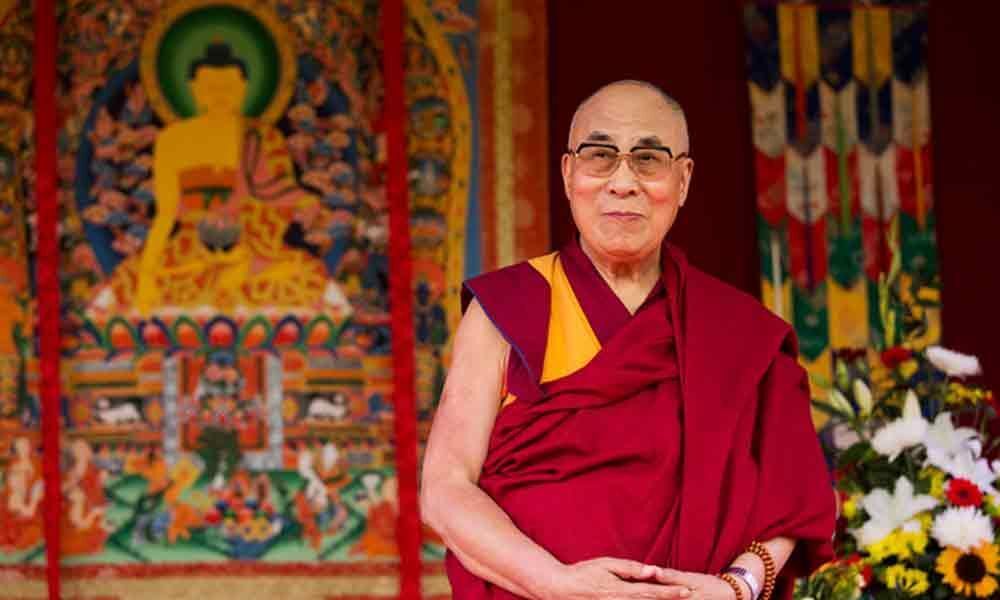Live
- UBI gesture to 3 welfare hostels
- Overwhelming response to Vijayawada Marathon
- Public Garden stepwell rots in apathy, walkers raise a stink
- Dinakar to send report to CM for justice to victims
- GHMC wakes up from slumber, out to tame stray dog menace
- Victoria Kjaer Theilvig: Denmark’s First Miss Universe Winner Makes History
- Health minister for action against ragging offenders
- HMWSSB lays focus on commercial buildings to fix sewage problem
- Rich tributes paid to Ramamurthy Naidu
- Denmark’s Victoria Crowned Miss Universe
Just In

Three journalists from Nepal's state news agency, RSS, are under probe for reporting news about Tibetan spiritual leader Dalai Lama.
Kathmandu: Three journalists from Nepal's state news agency, Rastriya Samachar Samiti (RSS), are under probe for reporting news about Tibetan spiritual leader Dalai Lama.
Journalists Mohani Risal, Somnath Lamichhane and Jivan Bhandari who work for the foreign desk of RSS are being investigated over news on Dalai Lama - much to China's anger.
The desk had dispatched news about the health condition of Tibetan spiritual leader - from that of his admission to his discharge from a hospital.
"They are under probe for dispatching such content which is very sensational for us," Hari Adhikari "Syamal", chairman of the RSS informed.
The probe was started after the Ministry of Communications and Information Technology ordered an investigation of the issue.
"They are being probed for the issue of a Dalai Lama related story following instructions by Ministry (Communications and Information Technology). The journalists have given their answer about coverage, they have mentioned that it was based on humanitarian ground and had a strong news sense and value as it was an issue of concern for all," a member from the committee formed to investigate the probe informed ANI seeking anonymity.
"This is not the first time that a journalist from RSS has been probed. Previously, the Chinese Embassy has had us pressured to censor news content as well as highlight those of their interest. Working space has been crippled due to this," a senior reporter working with the state agency of the Himalayan nation confirmed.
"We only wrote the news that we received from a subscribed foreign wire service. We transcribed the English contents mainly about the admission of Dalai Lama in hospital, improvement in health condition and his discharge. This caught the attention of the North because it bore a New Delhi dateline," one of the reporters being probed claimed, referring to China as "North".
The development comes at a time when the communist government is bringing on strong legislative measures, like the "Media Council Bill", to curb the freedom of journalists.
The Government of Nepal under the Prime Ministership of KP Sharma Oli last week have had registered the particular new bill in Parliament Secretariat proposing to fine journalists, media outlets, editors, publishers if they are found to be violating media code of ethics.
"The council can also get the aggrieved persons or institutions compensated if they suffer any loss due to the publication or broadcast of the material violating the code of conduct issued by the council," the section 18 (1) of the new bill states.
The compensation amount can range in between Nepal Rupees 25,000 to one million.
The adjoining sub-section (2) of the same section also has granted authority to the council to order the erring parties to pay compensation if the content in media outlets damages the image of the affected party.
The current Media Council Act, still in practice does not have such provisions of paying compensation to the aggrieved party, rather it requires publication of the affected party's version. Along with this, it makes recommendations to the government to partially or completely stop the subsidiaries and governmental facilities for a certain period of time.
Reciprocating current practice, the bill further explains that the council should forward the case to the concerned authority for legal actions if any case concerning media ethics also constitutes an offense under any existing law.
Along with the provision in the bill states that the media, publishers, editors or journalists can challenge the decision of the media council at the high court within 35 days of a verdict.
Also, proposed media bill, if adopted, would dismiss current watchdog body, the Press Council Nepal. A new body, Media Council, will be formed which drafts and implements a media code of ethics making it mandatory for the media houses to adopt an internal code of ethics in line with the council's code.
The Freedom Forum, a civil liberty group of Nepal in its April release had reported 104 incidents of press freedom violations in Nepal in the last 12 months, double that of 2017.
"Last year (2018) was challenging and disappointing for press freedom in Nepal because of the significant rise in the number of violations against the press, formulation of laws and policies unfavourable to the free press, and increased digital surveillance of journalists," the report stated.
The International Federation of Journalists also has called for the revision over the provisions of new media bill urging all the concerned authorities to maintain press freedom in the Himalayan nation.
"The harsh provisions proposed in this bill will have wide-reaching implications for press freedom in Nepal. The media cannot operate in an environment of fear and intimidation, which would be created by many of these proposed changes. We call on the Nepali government to conduct consultations with media stakeholders and revise the provisions immediately," IFJ said in the statement.

© 2024 Hyderabad Media House Limited/The Hans India. All rights reserved. Powered by hocalwire.com







